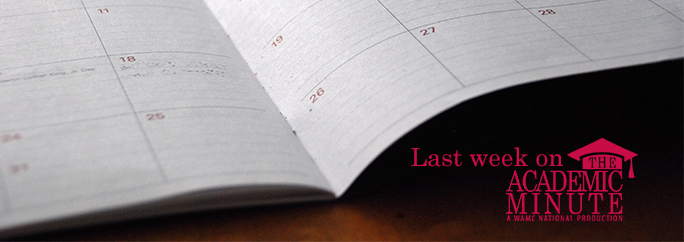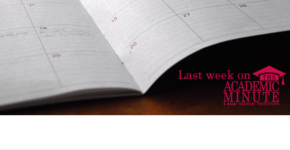
Academic Minute from 1.01 – 1.05
Monday, January 1st
Atorod Azizinamini – Florida International University
Accelerated Bridge Construction
Dr. Atorod Azizinamini was appointed by the College of Engineering and Computing at Florida International University (FIU) as the Chair of the Department of Civil and Environmental Engineering at FIU in January of 2011.
Dr. Azizinamini came to FIU from the University of Nebraska-Lincoln, where he was a Distinguished College of Engineering Professor and the Director of National Bridge Research Organization. A specialist in bridge engineering and expert in the field of accelerated bridge construction, he has been instrumental in facilitating the use of advanced materials and technologies in bridges by educating professional engineers and conducting major research studies. Dr. Azizinamini has also been an entrepreneur and a leader in developing innovative bridge systems and implementing novel concepts in practice. His patented “Folded Plate Girder” system provides a cost-effective solution for replacing deficient short span bridges, which account for the majority of the 650,000 bridges in the U.S. bridge inventory.
Tuesday, January 2nd
Andrea Lang – University at Albany
What Is the Polar Vortex?
Andrea Lopez Lang is an assistant professor in the Atmospheric and Environmental Sciences Department at the University at Albany, State University of New York. She teaches courses on atmospheric dynamics as well as introductory courses to weather and climate. Her research interests center on cool-season phenomena ranging from winter storms to variability of the polar vortex. Currently, she serves in the leadership group of the National Oceanic and Atmospheric Administration’s Task Force for Subseasonal–to–Seasonal Prediction. Andrea received her PhD in Atmospheric and Oceanic Science from the University of Wisconsin–Madison.
Wednesday, January 3rd
Ray Raymond – SUNY Ulster
The U.S. and U.K.’s Special Partnership
Dr. Ray Raymond is a former British diplomat who held a Post-Doctoral Fellowship at Yale University in American History. He is Associate Professor of Government and History at SUNY Ulster and also teaches government and politics at the United States Military Academy, West Point. In addition, Dr. Raymond is a regular visiting lecturer at the US Air Force Academy and Fellow of the Pell Center for International Relations and Public Policy. He is currently working on a new biography of John Jay as well as a collective biography of five recipients of West Point’s Ninninger Medal, the Academy’s equivalent of the Medal of Honor. Dr. Raymond has been honored by Her Majesty Queen Elizabeth II and by the Chief of Staff of the United States Army for his contribution to the development of the academic program at West Point.
Thursday, January 4th
Ashwini Tambe – University of Maryland
What Is Sexual Coercion?
Dr. Ashwini Tambe is Associate Professor in the Department of Women’s Studies. She is also the Editorial Director of the journal Feminist Studies [http://www.feministstudies.org/home.html], a premier venue for interdisciplinary feminist scholarship and creative expression. She has previously taught at the University of Toronto, Georgetown University and Temple University. Her interests include transnational feminist theory, modern South Asia, sexuality studies and global political economy. Her current work, supported by SSHRC and NEH grants, examines the legal paradoxes in age standards for sexual consent and the shifting definitions of girlhood. Dr. Tambe is also fascinated by the cosmopolitanism found in early women’s magazines in India, and is involved in analyzing and digitizing the archives of the Marathi magazine Stree.
Friday, January 5th
Leigh Ann Wheeler – Binghamton University
The ERA Movement in the #MeToo Era
Binghamton University’s History department combines the best of what I most value professionally — excellent, student-oriented teaching and rigorous, high-quality scholarship. Like my colleagues here, I consider teaching and scholarship to be mutually reinforcing activities. Preparing courses, facilitating discussions, and interacting with students stimulates my thinking and my enthusiasm for history in ways that more solitary work cannot. Moreover, the dynamic interplay among students and between myself and students, the clever questions and creative responses that make me think in new ways while demonstrating that my students are doing the same, the spontaneous retorts and thoughtful reflections, the moments of illumination when a student figures something out—all remind me how and why the work we do in and out of the classroom really matters.
